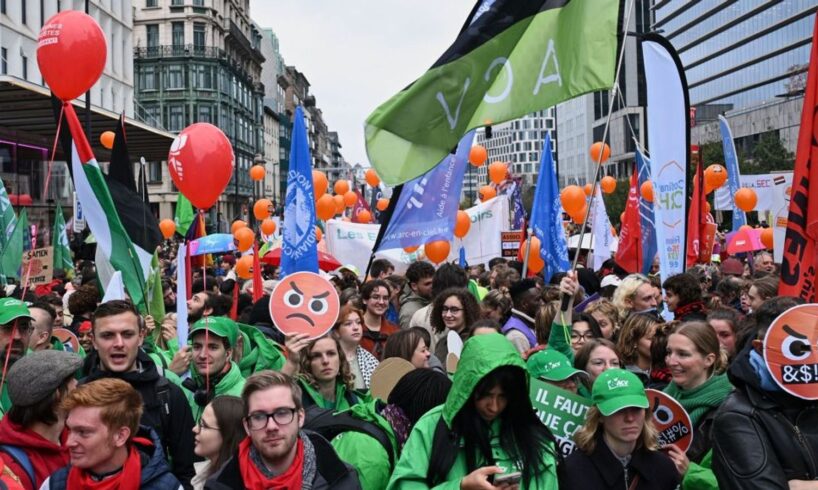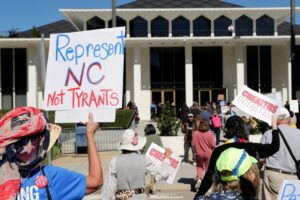
Workers struck on Tuesday in the third, and largest, general strike this year against proposals by Belgium’s right-wing coalition to cut public spending as it finalises next year’s budget.
People march with signs and balloons during a demonstration and general strike in Brussels, October 14, 2025 [AP Photo/Harry Nakos]
To save billions of euros, Prime Minister Bart De Wever’s government is seeking to increase the retirement age to 67 by 2030—and increase the number of days Belgians work per year before they are eligible. According to pension service estimates from October 2025, this change would cause workers to lose an average of €318 per month from their pensions.
Another key element of the cuts is to limit unemployment benefits to two years. Other cuts, including to child support and healthcare funding, are being scheduled, plus a rise in VAT sales tax.
Also planned are attacks on workplace protections and a freeze on wage indexation that overwhelmingly hit the working class, especially the lowest paid and shift workers.
The government is seeking to slash public spending by between €10-20 billion by 2029 to bring the federal deficit below the European Union’s 3 percent target. De Wever said that €10 billion cuts would be “the minimum required” by the European Commission, though “more would be better, if at all possible.”
The government is refusing to raise any taxes on the super-rich and the most affluent.
Belgium is also aiming to boost military spending to meet its pledges to NATO. In July, the government announced a €33.8 billion military spending programme covering 2026 through 2034. This blew the lid off its previous plan for defence spending to reach 2 percent of GDP by 2029, from 1.3 percent when the coalition took office.
Flemish nationalist De Wever’s five-party government came to power in early February after months of coalition talks following the federal elections in June last year. The “Arizona coalition”—named because the parties’ colours match those of the US state flag—is made up of three parties from Dutch-speaking Flanders: De Wever’s conservative N-VA, the centrist Christian-Democrats and the social democratic Vooruit (Onward). Also included is the Christian Democrat Les Engagés and right-wing Reformist Movement from French-speaking Wallonia.
The government’s class-war agenda has met with sustained opposition, with at least 88 strike days already held this year. These include major national strikes on February 21, March 31 (general strike), April 29 (general strike), May 22 and June 25.
Tuesday’s strike was called by the three largest union federations: the Confederation of Christian Trade Unions (ACV/CSC); the General Federation of Belgian Labour (FGTB/ABVV) and the General Confederation of Liberal Trade Unions of Belgium (CGSLB/ACLVB). Their combined membership is approximately 3.5 million.
The stoppage was, according to Politico, Belgium’s biggest demonstration of workers “in a decade,” since 100,000 were on the streets during a 2014 strike. While trains ran, most metro, bus, and tram lines in Brussels were halted. Disruption to the transport network in the Walloon and Flemish regions was also widespread.
All shipping at Europe’s second largest port, Antwerp, was suspended. The BBC reported, “more than 100 ships waited in the North Sea for permission to dock at three ports, according to Belgium’s MDK maritime and coastal services.”
Airports were hit as all departures and around half of the scheduled arrivals at Brussels International Airport were cancelled. At Brussels South Charleroi Airport, all flights were cancelled.
The Flemish Agency for Education Services reported that almost 10,000 (9,873) Flemish teachers and support staff participated in the stoppage. Refuse workers struck and administrative services were impacted. While courts in Brussels, Bruges and Antwerp were able to function, trials were postponed in several other urban areas including in Mechelen, Leuven, and Dendermonde, due to a lack of staff.
Up to 140,000 demonstrated in Brussels during the day. Politico reported, “Several of the protesters were carrying signs and banners saying ‘boucherie’ (French for ‘butchery’), a play on the name of Georges-Louis Bouchez, Belgium’s francophone liberal chief, whose center-right Reformist Movement (MR) party is part of the governing coalition. Others portrayed Prime Minister De Wever and Bouchez as butchers wielding knives.”
A group of strikers carried a large banner reading, “social health: vital”.
Strikers carried a placard modelled on a traffic speed symbol showing the number 67 with a red line through it, protesting the retirement age increase. The BBC spoke to a striker, Anaïs, aged 29, who said “65 is enough. 67 is too late. We are asked to work more, to work longer hours. It’s not fair. It’s about time we came together… It’s always the same part of the population that has to tighten their belts.”
Demonstrators faced vicious police repression as dozens were arrested. Police deployed tear gas and water cannon on the upmarket Boulevard Pachéco.
Politico reported that Rafael, a postal worker, whose eyes were red from the gas, said, “We were just marching peacefully and suddenly there were smoke bombs and police. I don’t get it. For maybe 10 troublemakers… they tear-gassed the entire crowd, the elderly, the children … It was shameful, an absolute disgrace.”
“Instead of addressing the issue, we prefer to tear-gas the entire population exercising its right to strike,’ said another participant.
Organisations helping the homeless and asylum seekers, who have faced swingeing budget cuts, participated in the demonstration.
The strike won widespread support from young people with the Brussels Times noting, “Students inside the IHECS university building were seen cheering on the demonstrators as they walk down Rue des Alexiens.”
The paper cited the comments of Izabella (19) and Nora (21), “part of the younger crowd protesting today” in Brussels. “They feel ‘blocked’ financially, especially regarding their studies. ‘It’s not the time to give up… because we need to feel hopeful for the future, because we are the future,’ said Nora.”
The militant movement of the working class in Belgium is part of a continent-wide fightback by the working class. In recent weeks there have been general strikes and mass protests in Greece, Italy, Spain, France, Germany and Britain as mass opposition spreads against governments imposing austerity, supporting genocide in Gaza and preparing to squander vast social resources on wars of conquest.
In every country the trade union bureaucracy is desperate to keep a lid on explosive social discontent, up to and including calling limited general strikes to allow rising anger to dissipate.
Politico reported comments from trade union bureaucrats concerned that the government was failing to recognise their traditional role in policing the class struggle. CGSLB spokesperson Alexandre Sutherland, said, “The government doesn’t listen to anyone and acts as it pleases without consulting workers. And, of course, this is unacceptable in a country like Belgium, which has functioned in this collaborative way for a very long time.”
Sign up for the WSWS email newsletter





